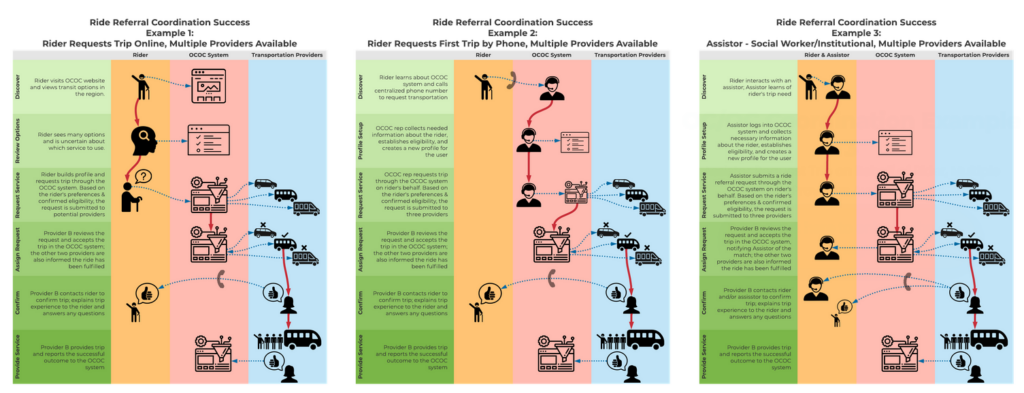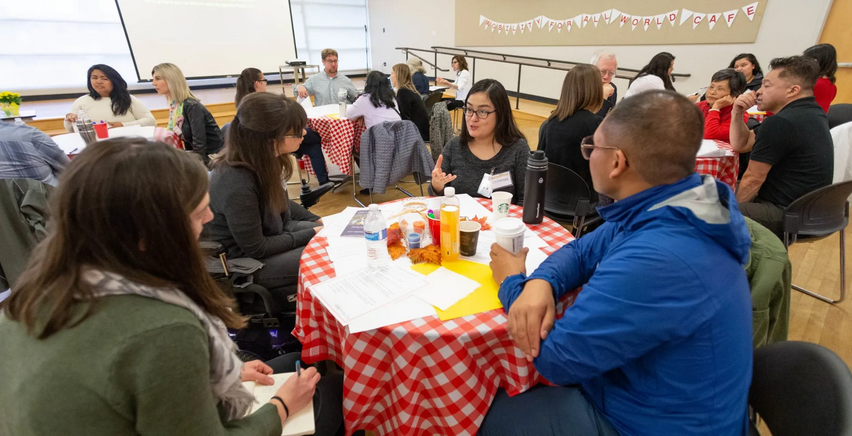One-Call/One-Click: Bridging the Gaps between Customers and Human Service Transportation Providers, Seattle, WA
15 minutes Date Launched/Enacted: Sep 30, 2022 Date Published: October 25, 2022

Brief Summary
- Hopelink and the King County Mobility Coalition (KCMC) are leading an effort to implement a One-Call/One-Click platform.
- One-Call/One-Click is a mobility-as-a-service (MaaS) platform that helps users discover human services transportation more efficiently.
- Hopelink and KCMC received an Inclusive Planning Grant to support the public outreach phase of their project. The grant stipulates that KCMC and Hopelink engage in at least six months of outreach activities that meaningfully include people with disabilities and seniors.
- Hopelink and KCMC are supporting the platform’s development with a Consolidated grant from the Washington State Department of Transportation.
Introduction
The scenarios are all too familiar: an elderly adult needs to travel to a medical appointment, a low-income family relies on public transportation or shared mobility to run errands, or a person with a disability would like to visit friends in a nearby community. Transportation options can be either scarce, confusing, or inconvenient depending on the time of day, geography, or distance required for a trip. Scheduling rides on non-emergency medical transportation services can be cumbersome, headways between buses can be long, and many shared mobility services are not ADA-accessible. Moreover, mobility systems are often complicated, decentralized, and unintuitive, placing the onus on users to identify how to navigate physical environments. While advances in technology, like the creation of the General Transit Feed Specification and other data standards, have improved the level of real-time information transportation users can access, individuals still must determine which mode of transportation to use for their trips. Hopelink, a local social service non-profit, and the King County Mobility Coalition (KCMC) are looking to ease this burden by implementing a One-Call/One-Click (OC/OC) platform. When the OC/OC system is developed, passengers, caretakers, assistors, and mobility managers can readily discover and book shared mobility services across the Seattle metropolitan area. This case study explores this upcoming OC/OC system and its implementation process.
History
The King County Mobility Coalition has routinely convened an Access to Healthcare Committee, consisting of healthcare professionals, transportation providers, and community members. Over several years, members have expressed frustration over the lack of coordination and difficulty getting to and from medical services for the transportation insecure. Groups like seniors, people with disabilities, immigrants, and low-income individuals often have less access to personally-owned vehicles; lower vehicle ownership combined with difficulty accessing amenities like healthcare and grocery stores often compounds into poorer health outcomes and quality of life. On the other hand, medical service and transportation providers often find it difficult to serve community members when they cannot easily disseminate information to different parties. This ongoing conflict led the King County Mobility Coalition to two events: a Hackathon in 2017 and an application for an Inclusive Planning Grant.
In September 2017, Hopelink participated in a hackathon with sponsorship from the City of Seattle and AARP, with a theme of “Finding and Booking Specialized Rides.” Here, software developers, project managers, and other technology professionals gathered to design a prototype for a central platform where individuals could discover human services transportation.
In 2018, Hopelink and the King County Mobility Coalition received an Inclusive Planning Grant, requiring that they undergo a six-month process where they solicited feedback across different communities. After issuing surveys and hosting community forums and listening sessions, KCMC determined that they had adequate support to move forward with One-Call/One-Click and a separate program called Community Transportation Navigators. Since then, Hopelink has been working hard to develop both the OC/OC platform and the Community Transportation Navigators program.
Program Operations and Goals
The One-Call/One Click system under Hopelink has yet to come into fruition, but plans exist for how it can serve its users and the Seattle metropolitan area more broadly. Three scenarios exist for how users can access this system:
- Rider requests a trip online: A user logs into the OC/OC platform and enters their trip needs. The platform sends the request and parameters to various providers, like human service agencies, non-profits, taxi companies, and transit agencies. One of the trip providers confirms that they can fulfill the request, automatically notifying other potential trip providers that the request is complete. The trip provider contacts the OC/OC user to confirm and book the trip detailsand provides the trip at the requested time.
- Rider requests a trip by phone: A user, who might not own a computer or smartphone, calls a central hotline, such as a 211-type of service, and makes their trip request. The trained call center staffer enters the trip request into a computer system, notifying potential trip providers of the request. As with the online request mentioned above, one of the trip providers confirms that they can fulfill the trip request, automatically notifying other potential trip providers that the trip request is complete. The trip provider contacts the OC/OC user to confirm the trip details and provides the trip at the requested time.
- Assistor requests the trip by phone or online: A caretaker, social worker, senior center employee, or mobility manager submits a request on someone else’s behalf. The system matches the rider to a service provider that can fulfill the request. The trip provider contacts the assistor and/or the individual needing to arrange the trip appointment and carries out the ride.

Description: Visual representations of One-Click/One-Call user scenarios.
Click on image for full view.
Credit: King County Mobility Coalition
Any individual needing a trip within the boundaries of One-Call/One-Click can access and use its platform at no cost. Once the platform is deployed, Hopelink plans on announcing its name. In the near term, data specifications will include the General Transit Feed Specification (GTFS) and GTFS-Flex; later on, KCMC might also integrate the General On-Demand Feed Specification (GOFS), GTFS-Eligibilities, and GTFS-Capabilities. These discovery specifications can help customers identify information about available transportation services, such as schedules, fares, seating, and accessibility features. In the future, the Transactional Data Specification (TDS), under development, could enable customers the ability to electronically book services on OC/OC as well. FlexDanmark, which operates on a specification similar to TDS, has supported a robust human services transportation network in Denmark. [1] In the meantime, booking remains a manual task facilitated by an OC/OC staff person.
Hopelink and the King County Mobility Coalition hope that One-Call/One-Click can achieve the following goals:
- Integrate trip discovery, booking, and registering for eligibility-based services into a single platform;
- Educate users about shared mobility services through improving their discoverability on the OC/OC platform;
- Facilitate partnerships between shared-mobility and public transit providers;
- Coordinate public transit providers around technology tools like OC/OC and management for GTFS (General Transit Feed Specification) feeds;
- Improve peoples’ experiences with their transportation journeys, especially for seniors and people with disabilities;
- Ease access to essential locations like medical facilities, grocery stores, and medical appointments; and
- Create an open-source product that is adaptable to communities elsewhere looking to improve the coordination of accessible transportation services.
Budget and Planning
Hopelink and the King County Mobility Coalition are supporting the One-Call/One-Click project with the following funding sources:
- $105,000 for an Inclusive Planning Grant from the Federal Administration for Community Living. This grant was awarded in two rounds, $35,000 in the first cycle and $70,000 in the second cycle.
- $148,063 consolidated grant plus a $101,936 supplemental award from the Washington State Department of Transportation. [2] The consolidated grant is sourced through Section 5310–Enhanced Mobility of Seniors & Individuals with Disabilities.
Marketing and Community Outreach
The Inclusive Planning Grant from the Administration for Community Living and the Community Transportation Association of America required the King County Mobility Coalition to prioritize extensive public outreach to diverse populations. As a condition of the grant, the King County Mobility Coalition carried out a six-month engagement process from June to December 2018. During this time, KCMC collected feedback from over 580 individuals through:
- Two Mobility for All Summits. These summits followed the World Café methodology, where participants engaged in several small roundtable discussions about their transportation experiences and needs.
- Four listening sessions hosted at non-profit organizations serving rural communities, people with disabilities, people with mental illness, people experiencing homelessness, and Latinx and immigrant communities.
- A survey in which 54% of respondents were aged 65 and over, 13% were caregivers, and 30% were people with disabilities. [3]

Description: Participants at a Mobility for All Summit.
Click on image for full view.
Credit: King County Mobility Coalition
Hopelink and the King County Mobility Coalition received additional funding and formed an Inclusive Planning Grant Steering Committee that lasted from April 2019 to January 2020. Through the Inclusive Planning Grant process, the King County Mobility Coalition determined it necessary to pursue the creation of a new One-Call/One-Click system.
Accessibility
As discussed above, the King County Mobility Coalition aimed to engage with people with disabilities, seniors, and low-income individuals through the Inclusive Planning Grant process. During the outreach process for the Inclusive Planning Grant, one of KCMC’s listening sessions was held with members at HERO House, a non-profit serving people with physical and mental disabilities. In a survey of community members, 30% of respondents were people with disabilities. [4]
Hopelink and KCMC plan to incorporate accessibility features into the OC/OC platform for its deployment, including screen readers, translation, and interpretation services. [5] Developers might also look to integrate AccessMap, a platform that helps individuals plan for pedestrian portions of trips and accounts for concerns like sidewalk accessibility. [6] KCMC also hopes to beta-test the OC/OC platform with community members to identify any concerns with accessibility and other software functionality. [7] While the OC/OC platform can serve any and all users in the Seattle area, Hopelink’s primary goal is to create a product that improves access and coordination for people in need of human services transportation.
Moving Forward
Hopelink’s effort to implement this One-Call/One-Click system is not the first such effort to exist in the United States, but has the potential to set an example for all communities across Washington and the United States moving forward. The platform has yet to receive its name as KCMC, software developers, transit agencies, and other transportation providers work to improve its utility. In the process, both Hopelink and KCMC are working extensively and collaboratively with social service providers, transit agencies, private transportation vendors, and community members to ensure that the One-Call/One-Click meets the needs of the entire Seattle area. Staff at Hopelink are deliberate in ensuring that the project does not just exist but is meaningful and successful–this requires strong community buy-in and engagement. As the OC/OC platform deploys in the coming months, it can hopefully be adapted to other communities elsewhere.
Key Considerations for Developing a One-Call/One-Click (OC/OC) MaaS Platform:
- How do you solicit ongoing feedback from potential partners and community members? Surveys? Open houses? Listening sessions?
- What local transportation agencies and vendors should you partner with to ensure that the impact of your platform is meaningful? What relationships do you have or should have with these partners?
- How can you demonstrate your proof of concept? How can you gain support for your project as you are developing it?
- How can you fund this project? From federal, state, and local sources? From private vendors or foundations?
- How can you engage community members most in need meaningfully throughout the development process?
References
- AARP Public Policy Institute: “Modernizing Demand-Responsive Transportation for the Age of New Mobility”, published December 15, 2020. https://www.aarp.org/ppi/info-2020/modernizing-demand-responsive-transportation.html?url.
- Washington State Department of Transportation: “Grant Programs & Awards: Consolidated”. https://wsdot.wa.gov/business-wsdot/grants/public-transportation-grants/grant-programs-and-awards/consolidated. Accessed October 12, 2022.
- King County Mobility Coalition: “Inclusive Planning Grant Overview”. https://irp-cdn.multiscreensite.com/c86a044e/files/uploaded/Inclusive%20Planning%20Grant%20Summary%202019.pdf. Accessed October 12, 2022.
- King County Mobility Coalition: “Inclusive Planning Grant Overview”.
- King County Mobility Coalition: “One-Call/One-Click”. https://www.kcmobility.org/ococ. Accessed October 12, 2022.
- King County Mobility Coalition: “Principal Components of the One-Call/One-Click System”, published August 16, 2022. https://irp.cdn-website.com/c86a044e/files/uploaded/Principal%20Components%20of%20the%20OCOC%20System%20V2.pdf.
- King County Mobility Coalition: “One-Call/One-Click”.